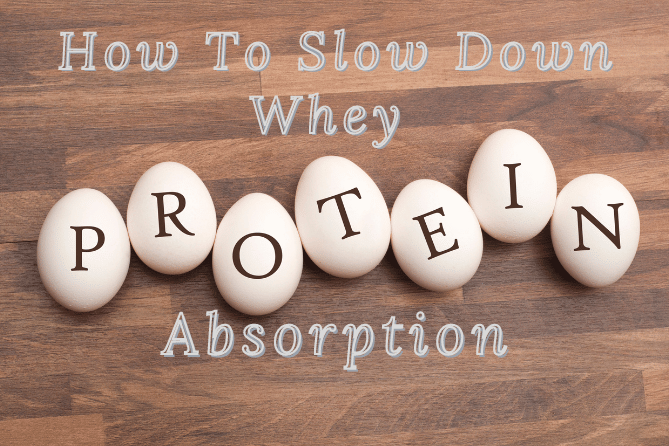Whey protein is a big deal in the fitness world. It’s a quality source of protein that helps you build muscle and recover from strenuous workouts. But there’s one downside to whey protein, it is notorious for being fast-acting and for promoting muscle growth.
However, if you’re not careful about how you time your whey protein intake, you could be metabolizing that protein too quickly – and missing out on all of its benefits.
To tackle this, you either consume whey protein moderately by drinking 1gram per kilogram body weight or change to casein protein. Usually, whey protein is meant for you to drink quickly and get instant results, so wishing for it to be slow absorbing is counter productive, in that case sticking to natural protein like chicken or eggs is better.
I’ll explain further below…
How To Make Whey Protein Absorption Slow
Protein is an essential part of any fitness routine, and the most popular protein consumption method in fitness is consuming whey protein. Those who consume whey protein do it so because they want their shiny muscles as soon as possible. And, that’s the intention companies try to satisfy when creating this supplement.
But in case you want to slow down this rapid acting protein, there are a few things you could do:
- The normal human instinct will tell you to reduce consumption or mix a lot of water. But that’s not the most optimal way. Because you’ve spent a lot of cash to get instant results.
- Move back to natural protein. Drink lots of eggs, chicken, legume, yogurt, etc. A good benchmark is consuming 1g per kg of body weight. Consume this much usual protein and you should be fine.
- Drink some milk or yogurt alongside the protein. This will add around 10g extra protein and slow down your digestion.
- Change your plan to Casein protein.
When someone wants their whey protein to act slow, that goes against their nature, because it’s not something they’re made to be. So, you’re kinda wasting your money by getting a fast acting supplement yet wanting to digest slowly.
Sticking to natural protein is the best case here. But if you really wanna be on supplements, then consider changing to casein protein.
How Much Whey Protein Is Too Much For An Adult Person?
There’s no one-size fits all answer to how much protein you should be taking in. Your age, weight, muscle mass and goals determine what is best for your body but a good starting point would be 1-2 scoops per day with 50 grams being the maximum allowed at any time during consumption.
For most people between the ages of 18-35 years old who are not active professionals or athletes but still desire muscle mass increases on can consume up to 0.8g-1g per kg bodyweight every day.
This will provide enough amino acids needed by muscles without being too overwhelming on the system as well give an offsetting benefit from other nutrients found naturally within foods like carbs or fats which can help balance out tasted flavors if consumed alongside them!
Active fitness freaks can take 1.2-1.7g per kg without having side effects whatsoever, since they’ll be doing all sorts of weight and muscle training. There are professionals who take 2g per kg or even 4g per kg as they are hyperactive but that could cause significant side effects to the regular person who does mild workouts at best [like me].
Frankly, you just read the manufacturer’s description. They do a great job of telling you how much whey protein you need in your system.
Does whey protein have side effects?
Whey protein indeed has side effects if you consume more than you should. There can be a variety of side effects associated with high whey protein doses, but they usually include an increase in bowel movements or acne.
Nausea is also common when taking supplements like these because it causes your stomach to feel sick with hunger for a short period of time after consuming them. It feels horrible, just like waiting in line for starbucks.
Increased thirst, sudden headaches are also some of the symptoms you’ll see if you overdo your whey protein intake.
Is whey protein safe for health?
Whenever supplements are the topic, the question for safety arises. So it didn’t surprise me when people started asking can a person damage their body by taking in too much whey protein? And, they’re right to ask that question.
Wheat-based proteins like whey are considered safe for consumption. There are, however, some people who may be allergic to dairy products and should consult their doctor before eating them in large quantities or regularly since it can cause stomach problems like lactose intolerance.
So yes it is safe, but dairy allergic people should consult a doctor first.
How Much Time Does It Take To Digest Whey Protein Completely?
The digestibility of whey protein is about 10 grams an hour. It will take two hours for a scoop [20g-25g] to be digested completely. Ideally you’ll be taking 2 scoops a day at the beginning, so it should take roughly 4 hours.
This will change as you increase your protein intake over time.
Is It Safe To Drink Whey Protein Without Working Out?
Whey protein is excellent for muscle synthesis, but that is when you work out. The very reason you drink a supplement is to overcome your deficit, not stack it up. So, if you don’t exercise there is no point in drinking whey protein; even worse, it’s detrimental.
Since you’re not working out, this whey protein intake is going to act as excess protein, and it’s gonna get absorbed fast. While it does not show immediate reaction, in the long run you’ll have a lot of problems.
First of all, some whey protein has calories in them, so you’re actively stockpiling carbs and not burning them through exercise. So you’ll gain weight- not the outcome you want, right?
The protein content in your urine will also rise. Also, long term overconsumption without exercising can lead to liver failure and cardiac arrest, heart arrhythmia, etc.
FAQ
Can we take whey protein empty stomach?
Whey protein will give you good results if you consume it on an empty stomach. A lot of expert do suggest taking it first thing in the morning.
What is the best liquid to take with whey protein?
It’s best if you mix your shake with a low calorie liquid like water or black coffee. Low sweet dairy are also an okay option, but water or coffee are the best.
Can we take whey protein at night
You can take whey protein at night if after a post workout session. It also helps you with sleep as the amino-acid tryptophan helps with serotonin and melatonin production.
Bottom Line
Whey protein is a popular supplement for athletes and people looking to build muscle mass. However, whey protein can also be hard on the digestive system if you overdo it. I’ve shown you some methods to slow down whey protein absorption but I wholeheartedly believe the best answer is to stick to a natural diet.


![Can You Mix Pre-Workout the Night Before a Workout? [Explains]](https://gears4fitness.com/wp-content/uploads/2024/02/Can-You-Mix-Pre-Workout-the-Night-Before-a-Workout-0.2-1.png)




